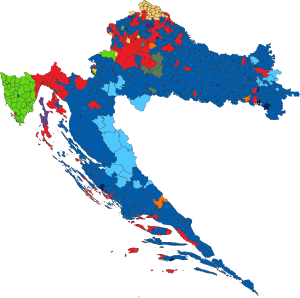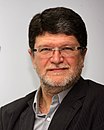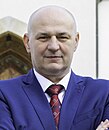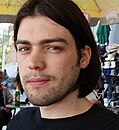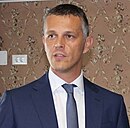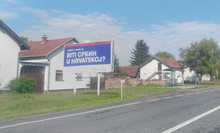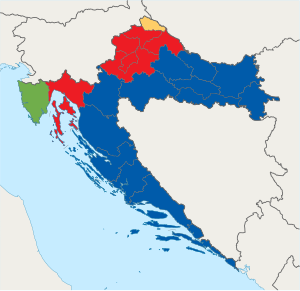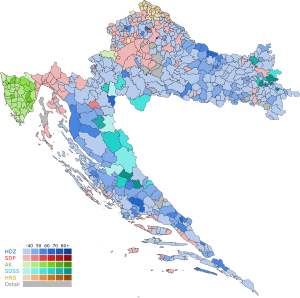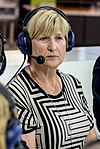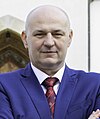
The Independent Democratic Serb Party is a social-democratic political party in Croatia representing the interests of the Croatian Serbs. It holds progressive, pro-European stances and is generally considered a centre-left party.

The Croatian Democratic Union is a major conservative, centre-right political party in Croatia. Since 2016, it has been the ruling political party in Croatia under the incumbent Prime Minister Andrej Plenković. It is one of the two major contemporary political parties in Croatia, along with the centre-left Social Democratic Party (SDP). It is currently the largest party in the Sabor with 55 seats. The HDZ governed Croatia from 1990 before the country gained independence from Yugoslavia until 2000 and, in coalition with junior partners, from 2003 to 2011, and since 2016. HDZ is a member of the Centrist Democrat International, International Democracy Union, and the European People's Party, and sits in the European People's Party Group in the European Parliament. HDZ is the first political party in Croatia to be convicted of corruption.

The Social Democratic Party of Croatia is a social democratic political party in Croatia. The SDP is anti-fascist, progressive, and strongly pro-European. The SDP was formed in 1990 as the successor of the League of Communists of Croatia, the Croatian branch of the League of Communists of Yugoslavia, which had governed Croatia within the Socialist Federal Republic of Yugoslavia since World War II.

The Croatian People's Party – Liberal Democrats is a social-liberal political party in Croatia.
Regular elections in Croatia are mandated by the Constitution and legislation enacted by Parliament. The presidency, Parliament, county prefects and assemblies, city and town mayors, and city and municipal councils are all elective offices. Since 1990, seven presidential elections have been held. During the same period, ten parliamentary elections were also held. In addition, there were nine nationwide local elections. Croatia has also held three elections to elect members of the European Parliament following its accession to the EU on 1 July 2013.

Parliamentary elections were held in Croatia on 25 November 2007 and for overseas voters on 24 and 25 November. The campaign officially started on 3 November. The President of Croatia announced elections on 17 October and 14 days were allowed for candidate lists to be submitted.

Rivers of Justice is a centre-left political alliance in Croatia. Gathered around the Social Democratic Party of Croatia (SDP), the coalition was originally formed in 2010 as the Kukuriku coalition. This somewhat facetious name meaning 'cock-a-doodle-doo', taken from a restaurant of the same name in Kastav where the coalition leaders first convened in July 2009, became well known and was eventually taken as the coalition's official name. The coalition originally consisted of four centrist and centre-left parties in the Croatian Parliament: the Social Democratic Party of Croatia (SDP), Croatian People's Party – Liberal Democrats (HNS-LD), Croatian Party of Pensioners (HSU) and Istrian Democratic Assembly (IDS). The coalition won an absolute majority of seats in the 2011 parliamentary election and successfully formed a government led by Zoran Milanović (SDP).
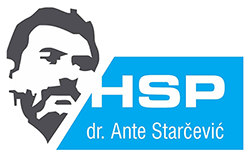
Croatian Party of Rights Dr. Ante Starčević was a nationalist political party in Croatia.

Andrej Plenković is a Croatian politician serving as the prime minister of Croatia since October 2016. He was previously one of eleven Croatian members of the European Parliament, serving from Croatia's accession to the European Union in 2013 until his resignation as MEP when he took office as prime minister. Plenković has also been serving as the president of the Croatian Democratic Union since 2016.

Davor Ivo Stier is a Croatian-Argentine politician and diplomat serving as member of the European Parliament since July 2024, having previously served from 2013 to 2016. He was a member of the Croatian Parliament in multiple terms, as well as the Minister of Foreign and European Affairs and Deputy Prime Minister of Croatia from 2016 to 2017.

Presidential elections were held in Croatia on 22 December 2019. Social Democratic Party nominee Zoran Milanović narrowly defeated incumbent president Kolinda Grabar-Kitarović in a second round of voting.
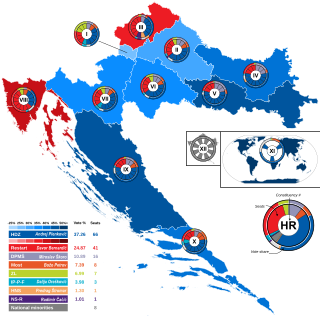
Parliamentary elections were held in Croatia on 5 July 2020. They were the tenth parliamentary elections since the first multi-party elections in 1990 and elected the 151 members of the Croatian Parliament. 140 Members of Parliament were elected from geographical electoral districts in Croatia, three MPs were chosen by the Croatian diaspora and eight MPs came from the ranks of citizens registered as belonging to any of the 22 constitutionally recognized national minorities.
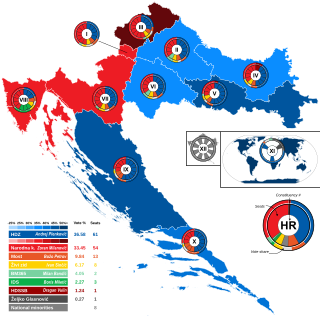
Parliamentary elections were held in Croatia on 11 September 2016, with all 151 seats in the Croatian Parliament up for election. The elections were preceded by a successful motion of no confidence against Prime Minister Tihomir Orešković and his cabinet on 16 June 2016, with 125 MPs voting in favour of the proposal. A subsequent attempt by the Patriotic Coalition to form a new parliamentary majority, with Minister of Finance Zdravko Marić as Prime Minister, failed and the Parliament voted to dissolve itself on 20 June 2016. The dissolution took effect on 15 July 2016, which made it possible for President Kolinda Grabar-Kitarović to officially call for elections on 11 September 2016. These were the ninth parliamentary elections since the 1990 multi-party elections.

The 2024 European Parliament elections in Croatia were held on 9 June 2024 as part of the 2024 European Parliament election. This was the fourth parliamentary election since Croatia's EU accession in 2013, and the first to take place after Brexit.

The Homeland Movement, previously known as Miroslav Škoro Homeland Movement until February 2021, is a nationalist and right-wing populist political party in Croatia. The DP was founded by Croatian singer, former Croatian Democratic Union MP, and 2019–20 presidential election candidate, Miroslav Škoro, on 29 February 2020.
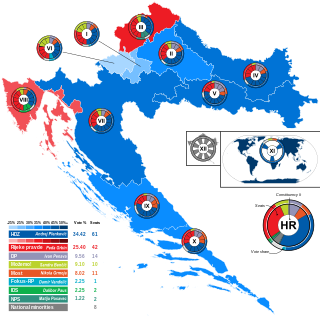
Parliamentary elections were held in Croatia on 17 April 2024 to elect the members of the 11th Sabor. Prior to the elections, the government consisted of a coalition of the Croatian Democratic Union and Independent Democratic Serb Party, with parliamentary support of five national minority MPs, two MPs from the Croatian Social Liberal Party and Croatian Demochristian Party, and one independent MP, Silvano Hrelja.
The Croatian Sovereignists are a conservative and Christian right-wing political party in Croatia. The party was founded in 2019 and is led by Marijan Pavliček.
A presidential election is scheduled to be held in Croatia in December 2024, with a second round in January 2025 if no candidate receives a majority. Incumbent president Zoran Milanović is eligible for a second term. His first term began on 19 February 2020 and will end on 18 February 2025.
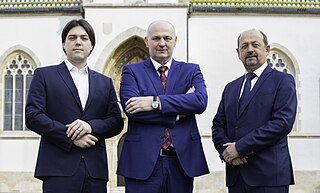
Law and Justice is a populist political party in Croatia. It was founded as a merger of The Key of Croatia, Let's Change Croatia (PH) and the Independent List of Mislav Kolakušić.
